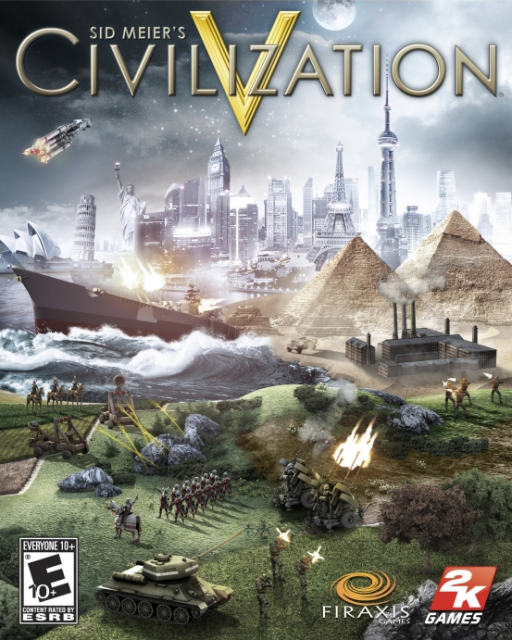A Fantastic Continuation of the Civilization Series
On the off-chance you’ve not encountered it before, Sid Meier’s Civilization is a series of turn-based strategy games which task you with leading one of the great civilisations from human history, and developing it over time from a group of a few scattered tribesmen to a thriving modern-day empire. Along the way you pick the technologies they adopt, what they build, their politics, their military decisions, and a whole lot more in an attempt to compete with other civilisations to fulfil one of the five victory conditions; cultural, diplomatic, military, scientific, or score-based. As a turn-based strategy title, Civilization has never been everyone’s cup of tea, but past Civ games have been highly praised by both critics and the strategy game audience for their addictive gameplay and all around satisfying nature.
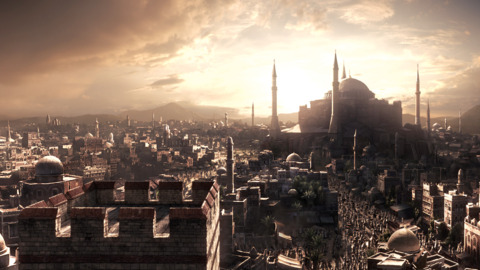
Released in late 2010, Sid Meier's Civilization V does not disappoint, and many of the best parts of Civilization V are the great elements of previous games it manages to bring with it. Everything about the civilizations and the journey you take as their leader, from the technologies, to the great world wonders, to the historical figures, and more, still feel like a fantastic nod to human legacy, creation, and culture that you just don’t find in other games, and give the whole experience a rather epic feel.
Like any good Civilization game, Civ V also features devilishly compulsive gameplay. It manages to bring back that winning formula that sees even rather complex systems like military conflicts or the growth of your empire distilled down into smaller, simple, straightforward tasks, not only making the game manageable, but also meaning that there’s always another milestone, major decision, or reward right around the corner that you want to keep playing to reach. It really manages to once again tap into that “One more turn” mindset that has made Civilization so hard to put down in the past. The only criticism I can really give of the game on this level is that games of Civ V often require quite a long time to play, even on the fastest speed, sadly meaning you’ll need a lot of patience and free time to experience Civ V’s multiplayer in particular.
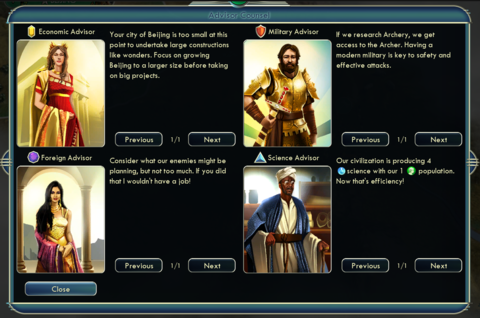
On the up side though, it feels like Civilization V manages to go further than ever in guiding players and making the game accessible, while still leaving players with plenty of decisions to make themselves. The game features an “advisor” system where you’re given a science advisor, an economic advisor, a military advisor, and a foreign advisor. Whenever you’re asked to choose which technology should be researched next or what should be built in a certain city, each advisor will give their own personal recommendation. At any time you can also talk to your advisors to read their analyses of your civ’s current situation, and their general recommendations for what to do next. This makes it easier than it's ever been for newcomers of the series to get to grips with Civ, and for more experienced players to just get some idea of where next to take their civilisation in their current situation.
In addition to regular civilisations, Civ V also introduces city states, which are probably best thought of as mini-civilisations. They have one city each and take up relatively small amounts of space on the map, but can be utilised as surprisingly useful tools for you and your opponents to get ahead in the game. You can become allied with them through defeating their enemies, offering them money, and other means, and once on your side they can provide you with military units, resources, and more. It’s easy to underestimate the value of city states, but they can be a powerful component in helping you achieve victory, and overall they manage to add a nice bit of spice to the game.
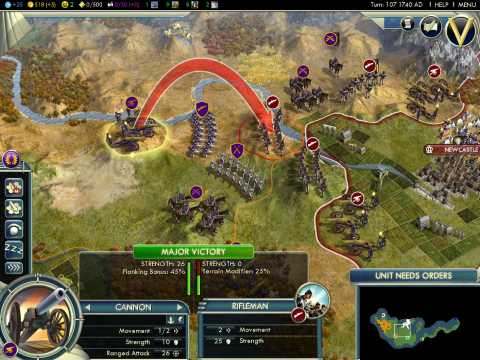
Another of Civilization V’s major changes involves unit placement. The game throws out past Civ games’ square grid layout and ability to stack multiple units on a single tile for something new. Civ V uses a hexagonal grid to lay out its world on and only allows one military unit and one non-military unit per space. This may not sound like a radical change, but it means that players can no longer pile huge quantities of units on one tile and just overwhelm their opponent with sheer numbers. With this new system just being able to pump out a big army means less and actual military strategy means more. Cities can also no longer be taken by simply moving your units into them when they are undefended, but have their own individual defence points which must be worn down before you can take them, as well as their own ranged attack, awarding them the difficulty to take it feels like they’ve always deserved.
Unfortunately, there still are a few problems when it comes to handling your units. It’s a tough problem for the designers to fix, but when you have large numbers of units that you need to move across the map, it gets rather tedious selecting each unit and then selecting their intended destination. In situations where you want to get your units to automatically explore the map, or wish them to find their way from one point to another over a number of turns, the game also seems to have no qualms allowing them to autonomously wander into city state territory, significantly damaging your relations with them. It’s perhaps not the biggest possible problem in the game, but when it rears its head it certainly can be frustrating.
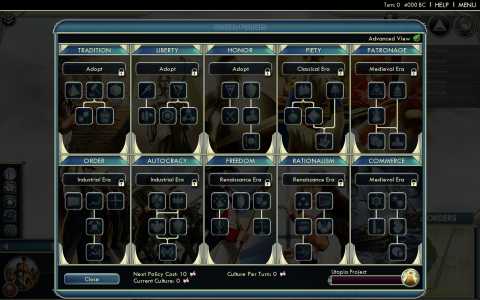
Strangely enough Civ V does make the decision to remove religions from the game. This doesn’t really have any detrimental effect on gameplay, but is none the less noteworthy. The game also sees a major change to the way culture is used; instead of it simply being a tool to expand borders, it is used to introduce new social policies, the effective replacement to Civ IV’s “civics”.
The “policies” screen in the game consists of two rows, each of which has five policy tracks on it. At first only a few policies on the top row are unlocked, but as the game progresses, more of these tracks become available for you to pursue. When you accumulate enough culture you can open up one of these policy tracks which will give your civ some kind of gameplay bonus and will also allow you access to the mini-tech tree of policies within it, each of which awards smaller bonuses. However, after adopting a new policy or policy track, the amount of culture needed to access the next one is increased.
Should you acquire all of the polices in a single track, you’ll get one big bonus, and completing five of these opens up the “Utopia Project”. Building this is Civ V’s new way of achieving cultural victory. Overall the new system means less dynamic shifting between the bonuses your civ receives, but it does provide more satisfying rewards as you work your way through a game, and a greater variation in an already pretty varied gameplay system, a welcome addition to the game.
Despite occasional problems with moving your units or the length of games, Civilisation V is beautiful, clever, and tremendously rewarding. Like previous Civ games it allows you to take a majestic journey through history with a wonderful appreciation for its own source material, but with changes to UI, social policies, combat, and other systems, is more satisfying, more accessible, and more addictive than ever. Civilization V is an excellent experience for both veteran conquerors and newbies in the world leader game alike.
